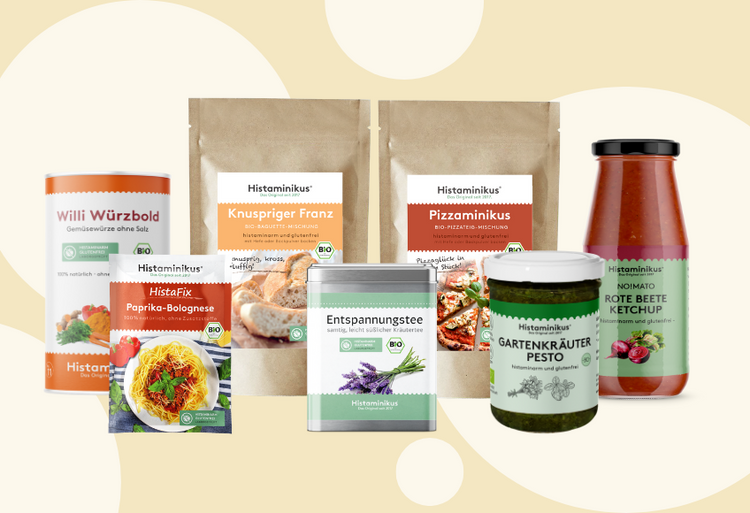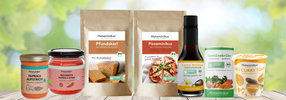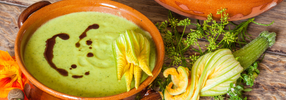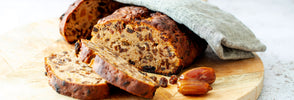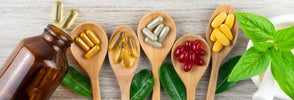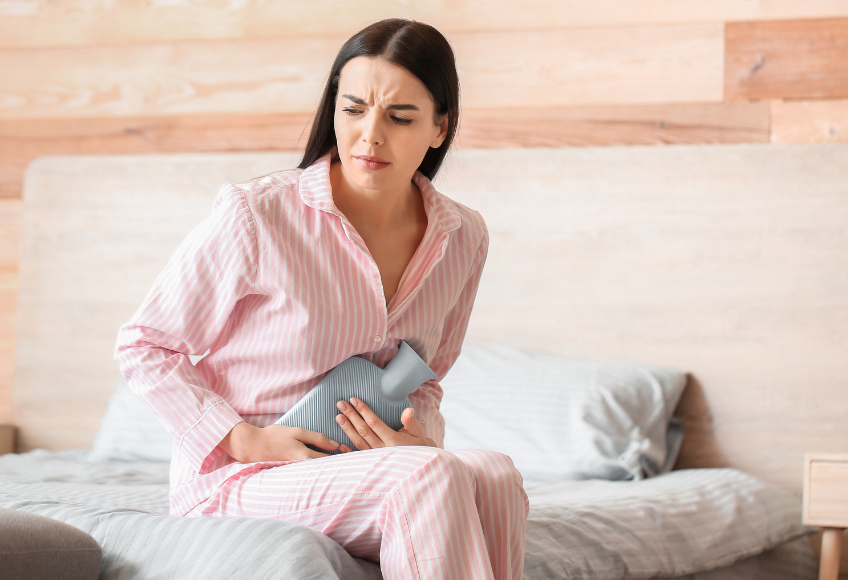
PMS and histamine intolerance
Shortly before the period, many women wonder why they have to fight symptoms every month. But just because many are affected does not mean that strong complaints are "normal" before the period. There can be causes such as a hormonal imbalance or a lack of important nutrients.
What is PMS?
PMS, the premenstrual syndrome, describes various physical and emotional symptoms in the days before the period. The symptoms occur regularly for a few days to two weeks before the period, i.e. in the time between ovulation and menstruation. When women in the second half of the cycle suffer particularly from psychological symptoms such as violent mood swings, irritability or even depression, experts speak of a premenstrual dysphoric disorder (PMDS). In English, the Premenstrual Dysphoric Disorder (PMDD) is called. PMDS is often referred to as a particularly heavy form of PMS - however, pain, stress and restrictions in everyday life can be enormous in both PMS and PMDs.
The exact causes of PMS and PMDs have not yet been fully clarified, but researchers assume a complex interplay of hormonal fluctuations and certain nerve messengers such as serotonin. In the second half of the cycle there is an imbalance between estrogen and progesterone, which can favor the symptoms. Genetics can also be involved - certain assessments in the hormone receptors can increase the risk of PMS. Women with PMS often have a lower serotonin level, which is why treatment that compensates for this messenger can be proven to help.
🙇🏼♀️ Physical symptoms:
• Breast pain, headache, back pain, muscle pain, joint pain
• fatigue and sleep disorders
• Digestion problems such as constipation, feeling of fullness and flatulence
• weight gain or the feeling of bloating
• Pain in the lower abdomen and cramps
• swelling and water retention in hands and feet
• Skin problems such as acne or local skin irritation
💭 Psychological symptoms:
• mood swings
• irritability
• Depressive moods
• poor concentration
• Drivelessness
• Reduced Libido
In principle, the symptoms of PMS can occur at any age - but they usually disappear when you start your period. Studies show that around 2 to 8 percent of women of childbearing age suffer from PMS and around 2 percent are even affected by a premenstrual dysphoric disorder (PMDS). However, experts suspect that every fifth woman actually had to struggle with PMS complaints-be it through pain or mental stress. If you suspect that something is wrong, it is always good if you turn to your gynecologist to exclude other causes.
Causes of PMS
Despite many years, the exact causes of PMS are not yet clear. PMS is not a single factor disorder, but is influenced by various factors. Today, experts often speak of a psychoendocrine dysfunction in which both the psyche, the nervous system and hormones play a role. The neurotransmitter serotonin in particular seems to be affected because its mirror fluctuates during the cycle and drops sharply shortly before the period.
The PMDS even proved a genetic hypersensitivity to sex hormones. Especially the hormonal changes in the second half of the cycle - such as the increase in progesterone and the decline of estrogen - can favor PMS. It is believed that some women also react more sensitive to the mining products of the progesterone or the interaction between progesterone and serotonin. In addition, the increase in prolactin can cause chest pain in this phase. Hormonal fluctuations also influence the fluid and electrolyte balance. Further influences such as low melatonin levels or thyroid problems are also discussed as causes. Life habits such as nutrition, too much sugar, caffeine, alcohol, nicotine and lack of exercise are also added. Women in whom the transition to the second half of the cycle or the period is prevented by medication or by surgery often have no PMS complaints.
The red dragon mechanist is a slightly bitter herbal tea that has a beneficial and calming effect during the period.
Histaminikus tea in organic quality is a naturally full of positive ingredients. The abundance of taste from the natural content of the plants gives special enjoyment experiences.
🍵 to tea
PMS and histamine
It has been suspected for a long time that female sex hormones influence the behavior of mast cells. Mast cells are cells of our immune system that release histamine if necessary. Many studies have proven that estrogen - especially in the form of estradiol - triggers the activation of mast cells. But estrogen not only ensures that histamine is released from the mast cells, estrogen also weakens the enzyme dao, which builds histamine. Histamine also has the ability to stimulate the ovaries, to produce more estrogen. This creates a vicious circle: estrogen promotes the release of histamine, and histamine in turn increases estrogen production. If you regularly consume histamine -rich foods, the estrogen level can fluctuate strongly, which confuses the hormone balance. Sensitivity to histamine can also increase when taking estrogen substitutes, and in some cases the drug can even trigger histamine intolerance. Progesterone is another important female hormone that plays a major role in the hormone balance. It prevents an estrogen surplus, ensures the right hormonal balance and inhibits the release of histamine from the mast cells. If there is too little progesterone, the estrogen level can increase, which in turn can lead to the problems mentioned above.
Mast cells were not only detected in the uterus, but also in the tissue of the placenta. The substances released by the mast cells in the placenta could play a role in regulating blood flow in the placenta and blood pressure. Histamine, which is released from the mast cells in the placenta, could also be involved in the mechanisms, which control the contraction of the uterus during birth, both in the event of a normal birth and premature birth. There is a connection between the histamine level in the placenta and the ability of the uterus to contract.
Histamine causes a contraction of the uterus in most mammals by activating the H1 Histamin receptors. In humans, histamine mainly leads to a contraction of the uterus. If H1 receptor antagonists were previously used, relaxation can also occur. There are also H2 receptor agonists, such as dimaprit who cause the human uterus to relax without blocking H1 receptors.
Stress is also considered an essential trigger of PMS! We have often mentioned the connection between stress and histamine, here you will find more information.
What to do with PMS?
Drug therapy
There are various approaches in drug treatment of PMS. Hormonal contraceptives that suppress ovulation - even in the long cycle without a break - can help regulate the symptoms. Pain relievers are used for severe pain, such as head, back or chest pain. In order to alleviate the symptoms caused by water retention, diuretics such as calcium, vitamins or spironolactone can be supportive. In severe cases, in which the mood also suffers sharply, selective serotonin reuptake inhibitors such as sertraline, citalopram or paroxetine are sometimes used-but usually only when other measures do not help sufficiently. However, drug therapy should not be the first choice. Many women initially prefer vegetable means because hormonal contraceptives and antidepressants can bring side effects. Preparations with a monk pepper extract offer a gentle way to treat chest pain, while St. John's wort can help to alleviate depressive moods, fears and unrest. With herbal preparations, too, you should speak to a doctor or therapist in advance and pay attention to your own tolerance limit.
👉🏼 Targeted nutrition
A conscious change in diet can do a lot. Try to consume less salty dishes, sugar, caffeinated drinks and alcohol and instead rely on vitamin and mineral-rich food- especially vitamins such as B6, D and E as well as calcium and magnesium. These changes can help relieve PMS complaints. Also regular enjoyment of omega-3 fatty acids as well as an additional supply of B vitamins and magnesium can have a positive effect on your mood and physical symptoms such as breaststroke, water retention and cravings.
👉🏼 Moderate movement
Movement and relaxation have an enormously positive influence on body and mind. Regular sport helps to remove excess water from the body, which in turn can help to loosen cramps in the uterus and to alleviate pain in the lower abdomen and back. Endurance activities such as walking, cycling, jogging or swimming are particularly suitable. Through physical activity, endorphins are increasingly released-the natural mood enhancement-and the production of the messenger fabric serotonin are stimulated, which contributes to relieving the PMS symptoms. However, pay good attention to your load limit, because physical exertion can lead to increased histamine release!
👉🏼 Relaxation exercises
Learning relaxation techniques such as yoga, autogenic training or progressive muscle relaxation can help you reduce stress and make the time more bearable before the period. These methods support you in better managing the emotional and physical challenges in this phase.
Collapsible content
SOURCES
- https://www.frauenaerzte-im-netz.de/erkrankungen/praemenstruelles-syndrom-pms/therapiemassnahmen-behandlung/
- https://pubmed.ncbi.nlm.nih.gov/12369287/
- https://histaminikus.de/blogs/blog/hormone-und-histaminintoleranz
- https://www.ndr.de/ratgeber/gesundheit/Praemenstruelles-Syndrom-PMS-Symptome-Diagnose-und-Behandlung,pms100.html
- https://www.frauenaerzte-im-netz.de/erkrankungen/praemenstruelles-syndrom-pms/ursachen/
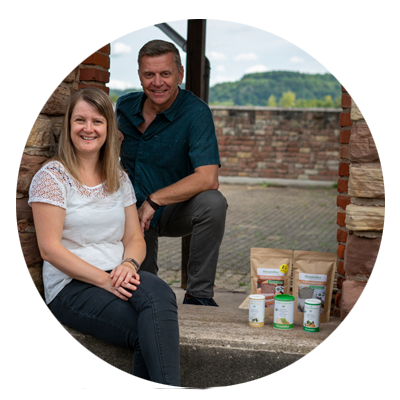
From those affected for those affected
We are Thomas and Michaela Zinser, founder of Histaminikus.
Because of the own histamine intolerance of Michaela and our son, we founded Histaminikus. The frustration does not find any suitable histamine food has spurred us to develop low -histamine food.
We would like to give you back a piece of quality of life. Feel free to look around with us.
Kind regards
Thomas and Michaela
